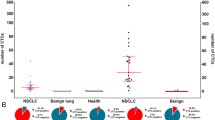Abstract
Background: Many human tumor cells display alterations in blood group antigen expression, and the loss of antigen A expression by non-small cell lung cancer (NSCLC) in blood group A patients has recently been associated with decreased survival.
Methods: To confirm this finding, we performed a retrospective study of 62 NSCLC patients undergoing potentially curative resection between August 1987 and December 1991 who were blood group A and had paraffin-embedded primary lung cancer tissue suitable for immunohistological analysis of antigen A expression. Twenty-seven patients expressed antigen A in their tumors, whereas 35 had loss of antigen expression. Disease-free survival (DFS) curves were calculated for stage I (n=26) and IIIA (n=25) patients.
Results: The two groups of patients with or without antigen A expression did not have significantly different DFS. A proportional hazards regression analysis identified no significant difference in the DFS of stage I patients with or without antigen A, but stage IIIA patients who had preservation of antigen A had significantly shorter DFS than did those who lost antigen A (p=0.0002).
Conclusions: The loss of expression of antigen A by primary tumor cells was not a significant adverse prognostic factor in DFS in our series, and we would recommend further studies to define clearly the clinical importance of antigen A expression in pulmonary carcinoma.
Similar content being viewed by others
References
Davidsohn I, Kovarik S, Lee CL. A, B, and O substances in gastrointestinal carcinoma.Arch Pathol 1966;81:381–90.
Kovarik S, Davidsohn I, Stejskal R. ABO antigens in cancer: detection with the mixed cell agglutination reaction.Arch Pathol 1968;86:12–21.
Davidsohn I, Kovarik S, Ni LY. Isoantigens A, B, and H in benign and malignant lesions of the cervix.Arch Pathol 1969;87:306–14.
Davidsohn I, Ni LY. Loss of isoantigens A, B, and I in carcinoma of the lung.Am J Pathol 1969;57:307–34.
Hirohashi S, Ino Y, Kodama T, Shimosato Y. Distribution of blood group antigens A, B, H, and I (Ma) in mucus-producing adenocarcinoma of human lung.J Natl Cancer Inst 1984;72:1299–305.
Hakomori S. Aberrant glycosylation in tumors and tumor-associated carbohydrate antigens.Adv Cancer Res 1989;52:257–331.
Davidsohn I, Norris HJ, Stejskal R, Lill P. Metastatic squamous cell carcinoma of the cervix: the role of immunology in its pathogenesis.Arch Pathol 1973;95:132–4.
Juhl BR, Hartzen SH, Hainau B. A, B, H antigen expression in transitional cell carcinomas of the urinary bladder.Cancer 1986;57:1768–75.
Lee JS, Ro JY, Sahin AA, Hong WK, Brown BW, Mountain CF, Hittelman WN. Expression of blood-group antigen A—a favorable prognostic factor in non-small-cell lung cancer.N Engl J Med 1991;324:1084–90.
Miyake M, Taki T, Hitomi S, Hakomori S-I. Correlation of expression of H/Le4/Leb antigens with survival in patients with carcinoma of the lung.N Engl J Med 1992;327:14–8.
Kaplan EL, Meier P. Nonparametric estimation for incomplete observations.J Am Stat Assoc 1958;53:457–81.
Mantel N. Evaluation of survival data and two new rank order statistics arising in its consideration.Cancer Chem Rep 1966;50:163–70.
Breslow N. A generalized Kruskal-Wallis test for comparing K samples subject to unequal patterns of censorship.Biometrika 1970;57:579–94.
Cox DR. Regression models and life tables.J R Stat Soc 1972;34:187–220.
Dixon WJ.BMDP statistical software. Berkeley, CA: University of California Press, 1985.
Mountain CF. Prognostic implications of the international staging system for lung cancer.Semin Oncol 1988;15:236–45.
Gail MH, Eagan RT, Feld R, Ginsberg R, Goodell B, Hill L, Holmes EC, et al. Prognostic factors in patients with resected stage I non-small cell lung cancer: a report from the Lung Cancer Study Group.Cancer 1984;54:1802–13.
Naruke T, Goya T, Tsuchiya T, Suemasu K. Prognosis and survival in resected lung carcinoma based on the new international staging system.J Thorac Cardiovasc Surg 1988;96:440–7.
Miyake M, Hakomori SI. A specific cell surface glycoconjugate controlling cell motility: evidence by functional monoclonal antibodies that inhibit cell motility and tumor cell metastasis.Biochemistry 1991;30:3328–34.
Hilsenbeck SG, Clark GM, McGuire WL. Why do so many prognostic factors fail to pan out?Breast Cancer Res Treat 1992;22:197–206.
Author information
Authors and Affiliations
Rights and permissions
About this article
Cite this article
Gwin, J.L., Klein-Szanto, A.J.P., Zhang, SY. et al. Loss of blood group antigen a in non-small cell lung cancer. Annals of Surgical Oncology 1, 423–427 (1994). https://doi.org/10.1007/BF02303816
Received:
Accepted:
Issue Date:
DOI: https://doi.org/10.1007/BF02303816




